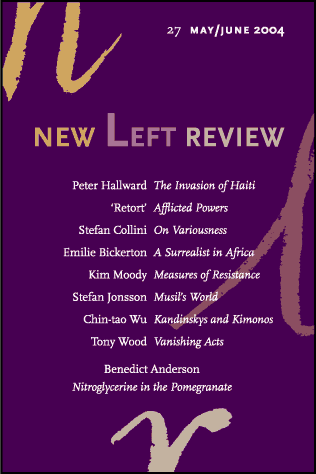
CONTENTS
-
Retort: Afflicted Powers
The current global conjuncture as a collision between brute imperial interests and blunders in hegemonic control of the image-world. State power and spectacular warfare after September 11, in the view of the Bay Area’s Situationist collective.
-
Peter Hallward: Option Zero in Haiti
A very multilateral coup. Franco-American harmony and unanimous blessings from the Security Council for the overthrow of a constitutional government and crushing of popular hope, in the Western hemisphere’s poorest nation-state.
-
Emilie Bickerton: The Camera Possessed
Extraordinary career of Jean Rouch—surrealist, engineer, anthropologist, cinéaste—synthesizing the gains of Vertov and Flaherty, to take his camera inside the taboo. In Abidjan and Paris, ethnographical films appropriated by their subjects as springboard for the New Wave.
-
Stefan Collini: On Variousness; and On Persuasion
The resources culture may appropriately furnish for a critique of society, not always unpolitical, defended against Francis Mulhern’s case in Metaculture and its sequels. Does criticism persuade by attraction of example, or by force of proposition?
-
Benedict Anderson: Nitroglycerine in the Pomegranate
Literary interactions between world capital and colonial periphery in the late nineteenth century—how rebel Filipino novelist José Rizal transformed elements of decadent aestheticism in Huysmans’s À Rebours, to explosive political effect.
-
Chin-tao Wu: Tokyo's High-Art Emporia
Why Japanese department-store owners turned their upper floors over to Vuillard, Degas and Kandinsky at the height of the bubble economy. Consumption of high art as packaging for the mass commodity.
-
Stefan Jonsson: A Citizen of Kakania
Stefan Jonsson on Karl Corino, Robert Musil: Eine Biographie. Correspondences between The Man Without Qualities and the turbulent life and times of its creator, in a definitive new German biography.
-
Tony Wood: Vanishing Acts
Tony Wood on Corinne Diserens, ed., Gordon Matta-Clark. Dissections of architectural space in the 60s and 70s, and their meaning in contemporary criticism. Did Matta-Clark’s disappearing art works leave behind a radical grin?
-
Kim Moody: Workers of the World
Kim Moody on Beverly Silver, Forces of Labour. Investigation of the historically shifting frontiers of working-class resistance, from 1870s Northern heartlands to the newly industrializing periphery of South Africa, Brazil and South Korea.
Articles:
-
Retort,
‘Afflicted Powers’
The current global conjuncture as a collision between brute imperial interests and blunders in hegemonic control of the image-world. State power and spectacular warfare after September 11, in the view of the Bay Area’s Situationist collective.
-
Emilie Bickerton,
‘The Camera Possessed’
Extraordinary career of Jean Rouch—surrealist, engineer, anthropologist, cinéaste—synthesizing the gains of Vertov and Flaherty, to take his camera inside the taboo. In Abidjan and Paris, ethnographical films appropriated by their subjects as springboard for the New Wave.
-
Benedict Anderson,
‘Nitroglycerine in the Pomegranate’
Literary interactions between world capital and colonial periphery in the late nineteenth century—how rebel Filipino novelist José Rizal transformed elements of decadent aestheticism in Huysmans’s À Rebours, to explosive political effect.
-
Stefan Jonsson,
‘A Citizen of Kakania’
Stefan Jonsson on Karl Corino, Robert Musil: Eine Biographie. Correspondences between The Man Without Qualities and the turbulent life and times of its creator, in a definitive new German biography.
-
Kim Moody,
‘Workers of the World’
Kim Moody on Beverly Silver, Forces of Labour. Investigation of the historically shifting frontiers of working-class resistance, from 1870s Northern heartlands to the newly industrializing periphery of South Africa, Brazil and South Korea.
Editorials:
Articles:
-
Peter Hallward,
‘Option Zero in Haiti’
A very multilateral coup. Franco-American harmony and unanimous blessings from the Security Council for the overthrow of a constitutional government and crushing of popular hope, in the Western hemisphere’s poorest nation-state.
-
Stefan Collini,
‘On Variousness; and On Persuasion’
The resources culture may appropriately furnish for a critique of society, not always unpolitical, defended against Francis Mulhern’s case in Metaculture and its sequels. Does criticism persuade by attraction of example, or by force of proposition?
-
Chin-tao Wu,
‘Tokyo's High-Art Emporia’
Why Japanese department-store owners turned their upper floors over to Vuillard, Degas and Kandinsky at the height of the bubble economy. Consumption of high art as packaging for the mass commodity.
-
Tony Wood,
‘Vanishing Acts’
Tony Wood on Corinne Diserens, ed., Gordon Matta-Clark. Dissections of architectural space in the 60s and 70s, and their meaning in contemporary criticism. Did Matta-Clark’s disappearing art works leave behind a radical grin?

